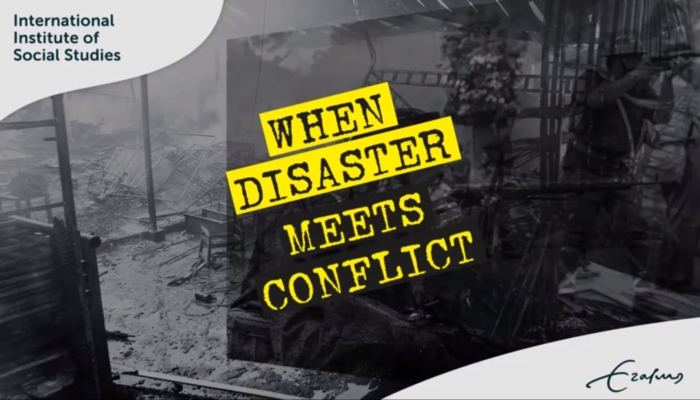
- This event has passed.
When Disaster meets Conflict: Coordination, decision-making and targeting (PART 1) & Localization (PART 2)

13 October, 2020 @ 10:00 am – 1:30 pm
When disasters happen in a conflict-setting, responses involve many state and non-state actors that try to reach affected populations. Who are these actors and do they work together? Who can affected communities trust to work for their interests? How are politics interfering in their actions?
These were some of the questions which directed research during the five-year research project When Disaster Meets Conflict. The research focused on the nexus between humanitarian aid and disaster governance. Case studies were done in high-conflict settings in Afghanistan, South Sudan and Yemen; in low-intensity conflict settings in Ethiopia, Zimbabwe and Myanmar, and in post-conflict settings in Nepal, Sierra Leone and Haiti.
The International Institute of Social Studies of Erasmus University Rotterdam has the honor to invite you to the Online Conference ‘When Disaster meets Conflict: Lessons on Disaster Governance and Humanitarian Action’. During the conference the main findings will be presented and discussed with stakeholders that are active in the Disaster-Conflict nexus.
Program
Workshops
During these online working sessions, the researchers of the project will discuss in-depth specific findings with a selected group of practitioners.
Tuesday 13 October, 10:00-11:30 (CEST) | Workshop 1: Coordination, decision-making and targeting
- In conflict-affected settings, decision-making is not always decided upon needs alone and coordination can be challenging. How does this work in practice? How are disaster-related actions decided and coordinated? These – and other findings – will be discussed in this working session.
Join workshop 1 via this link.
Tuesday 13 October 12:00-13:30 (CEST) | Workshop 2: Localization
- The localisation of disaster response has mainly focused on transferring funds to local NGOs, but not on addressing the challenges of ‘shifting the power’ and the diversity of local actors. Therefore, the question remains: how is the localisation of humanitarian governance socially negotiated in practice? This – and other findings – will be discussed in this working session.
Join workshop 2 via this link.


